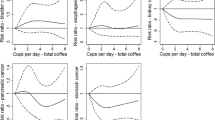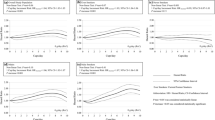Abstract
Background
Despite potentially relevant chemical differences between filtered and boiled coffee, this study is the first to investigate consumption in relation to the risk of incident cancer.
Methods
Subjects were from the Västerbotten Intervention Project (64,603 participants, including 3,034 cases), with up to 15 years of follow-up. Hazard ratios (HR) were calculated by multivariate Cox regression.
Results
No associations were found for all cancer sites combined, or for prostate or colorectal cancer. For breast cancer, boiled coffee ≥4 versus <1 occasions/day was associated with a reduced risk (HR = 0.52, CI = 0.30–0.88, p trend = 0.247). An increased risk of premenopausal and a reduced risk of postmenopausal breast cancer were found for both total (HRpremenopausal = 1.69, CI = 0.96–2.98, p trend = 0.015, HRpostmenopausal = 0.60, CI = 0.39–0.93, p trend = 0.006) and filtered coffee (HRpremenopausal = 1.76, CI = 1.04–3.00, p trend = 0.045, HRpostmenopausal = 0.52, CI = 0.30–0.88, p trend = 0.045). Boiled coffee was positively associated with the risk of respiratory tract cancer (HR = 1.81, CI = 1.06–3.08, p trend = 0.084), a finding limited to men. Main results for less common cancer types included total coffee in renal cell cancer (HR = 0.30, CI = 0.11–0.79, p trend = 0.009) and boiled coffee in pancreas cancer (HR = 2.51 CI = 1.15–5.50, p trend = 0.006).
Conclusion
These findings demonstrate, for the first time, the potential relevance of brewing method in investigations of coffee consumption and cancer risk, but they must be confirmed in future studies.

Similar content being viewed by others
Abbreviations
- BMI:
-
Body mass index
- CI:
-
Confidence interval
- FFQ:
-
Food frequency questionnaire
- HR:
-
Hazard ratio
- ICD7:
-
International Classification of Diseases, Revision 7
- n :
-
Number
- PLS:
-
Partial least square
- VIP:
-
The Västerbotten Intervention Project
References
Nkondjock A (2009) Coffee consumption and the risk of cancer: an overview. Cancer Lett 277(2):121–125
Lee AH, Fraser ML, Binns CW (2009) Tea, coffee and prostate cancer. Mol Nutr Food Res 53(2):256–265
Tang N, Zhou B, Wang B, Yu R (2009) Coffee consumption and risk of breast cancer: a metaanalysis. Am J Obstet Gynecol 200(3):291–299
Je Y, Liu W, Giovannucci E (2009) Coffee consumption and risk of colorectal cancer: a systematic review and meta-analysis of prospective cohort studies. Int J Cancer 124(7):1662–1668
Tang N, Wu Y, Ma J, Wang B, Yu R (2010) Coffee consumption and risk of lung cancer: a meta-analysis. Lung Cancer 67(1):17–22
Larsson SC, Bergkvist L, Wolk A (2009) Coffee and black tea consumption and risk of breast cancer by estrogen and progesterone receptor status in a Swedish cohort. Cancer Causes Control (e-published)
Baker JA, Beehler GP, Sawant AC, Jayaprakash V, McCann SE, Moysich KB (2006) Consumption of coffee, but not black tea, is associated with decreased risk of premenopausal breast cancer. J Nutr 136(1):166–171
Bhoo Pathy N, Peeters P, van Gils C et al. (2009) Coffee and tea intake and risk of breast cancer. Breast Cancer Res Treat (e-published)
Bravi F, Bosetti C, Tavani A et al (2007) Coffee drinking and hepatocellular carcinoma risk: a meta-analysis. Hepatology 46(2):430–435
Bravi F, Bosetti C, Tavani A, La Vecchia C (2009) Coffee drinking and hepatocellular carcinoma: an update. Hepatology 50(4):1317–1318
Pelucchi C, La Vecchia C (2009) Alcohol, coffee, and bladder cancer risk: a review of epidemiological studies. Eur J Cancer Prev 18(1):62–68
Tavani A, Pregnolato A, Negri E et al (1997) Diet and risk of lymphoid neoplasms and soft tissue sarcomas. Nutr Cancer 27(3):256–260
Bravi F, Scotti L, Bosetti C et al (2009) Coffee drinking and endometrial cancer risk: a metaanalysis of observational studies. Am J Obstet Gynecol 200(2):130–135
Hart AR, Kennedy H, Harvey I (2008) Pancreatic cancer: a review of the evidence on causation. Clin Gastroenterol Hepatol 6(3):275–282
Steevens J, Schouten LJ, Verhage BA, Goldbohm RA, van den Brandt PA (2007) Tea and coffee drinking and ovarian cancer risk: results from the Netherlands Cohort Study and a meta-analysis. Br J Cancer 97(9):1291–1294
Botelho F, Lunet N, Barros H (2006) Coffee and gastric cancer: systematic review and meta-analysis. Cadernos de saude publica/Ministerio da Saude, Fundacao Oswaldo Cruz, Escola Nacional de Saude Publica, 22(5), pp 889–900
Lee JE, Hunter DJ, Spiegelman D et al (2007) Intakes of coffee, tea, milk, soda and juice and renal cell cancer in a pooled analysis of 13 prospective studies. Int J Cancer 121(10):2246–2253
Naldi L, Gallus S, Tavani A, Imberti GL, La Vecchia C (2004) Risk of melanoma and vitamin A, coffee and alcohol: a case–control study from Italy. Eur J Cancer Prev 13(6):503–508
Larsson SC, Wolk A (2007) Coffee consumption and risk of liver cancer: a meta-analysis. Gastroenterology 132(5):1740–1745
Islami F, Boffetta P, Ren JS, Pedoeim L, Khatib D, Kamangar F (2009) High-temperature beverages and foods and esophageal cancer risk–a systematic review. Int J Cancer 125(3):491–524
Lueth NA, Anderson KE, Harnack LJ, Fulkerson JA, Robien K (2008) Coffee and caffeine intake and the risk of ovarian cancer: the Iowa Women’s Health Study. Cancer Causes Control 19(10):1365–1372
Veierod MB, Thelle DS, Laake P (1997) Diet and risk of cutaneous malignant melanoma: a prospective study of 50,757 Norwegian men and women. Int J Cancer 71(4):600–604
Urgert R, van der Weg G, Kosmeijer-Schuil TG, van de Bovenkamp P, Hovenier R, Katan MB (1995) Levels of the cholesterol-elevating diterpenes cafestol and kahweol in various coffee brews. J Agric Food Chem 43:2167–2172
Casal S, Oliveira MB, Alves MR, Ferreira MA (2000) Discriminate analysis of roasted coffee varieties for trigonelline, nicotinic acid, and caffeine content. J Agric Food Chem 48(8):3420–3424
Richelle M, Tavazzi I, Offord E (2001) Comparison of the antioxidant activity of commonly consumed polyphenolic beverages (coffee, cocoa, and tea) prepared per cup serving. J Agric Food Chem 49(7):3438–3442
Hallmans G, Agren A, Johansson G et al (2003) Cardiovascular disease and diabetes in the Northern Sweden Health and Disease Study Cohort—evaluation of risk factors and their interactions. Scand J Public Health 61:18–24
Weinehall L, Hallgren CG, Westman G, Janlert U, Wall S (1998) Reduction of selection bias in primary prevention of cardiovascular disease through involvement of primary health care. Scand J Prim Health Care 16(3):171–176
Johansson I, Hallmans G, Wikman A, Biessy C, Riboli E, Kaaks R (2002) Validation and calibration of food-frequency questionnaire measurements in the Northern Sweden Health and Disease cohort. Public Health Nutr 5(3):487–496
Winkvist A, Hornell A, Hallmans G, Lindahl B, Weinehall L, Johansson I (2009) More distinct food intake patterns among women than men in northern Sweden: a population-based survey. Nutr J 8:12
World Cancer Research Fund: Food, nutrition, physical activity, and the prevention of cancer. Washington, DC: American Institute for Cancer Research 2007
Kotsopoulos J, Vitonis AF, Terry KL et al (2009) Coffee intake, variants in genes involved in caffeine metabolism, and the risk of epithelial ovarian cancer. Cancer Causes Control 20(3):335–344
Mense SM, Hei TK, Ganju RK, Bhat HK (2008) Phytoestrogens and breast cancer prevention: possible mechanisms of action. Environ Health Perspect 116(4):426–433
Cavin C, Holzhaeuser D, Scharf G, Constable A, Huber WW, Schilter B (2002) Cafestol and kahweol, two coffee specific diterpenes with anticarcinogenic activity. Food Chem Toxicol 40(8):1155–1163
Parkin DM, Muir CS (1992) Cancer incidence in five continents comparability and quality of data. IARC Sci Publ 120:45–173
Nilsson LM, Wennberg M, Lindahl B, Eliasson M, Jansson JH, Van Guelpen B (2009) Consumption of filtered and boiled coffee and the risk of first acute myocardial infarction; a nested case/referent study. Nutr Metab Cardiovasc Dis (e-published)
Acknowledgments
This work was supported by the Joint Committee of the Northern Sweden Health Care Region, Västerbotten County Council, the Swedish Research Council, the Swedish Council for Working Life and Social Research, the Cancer Research Foundation in Northern Sweden and HELGA/Nordforsk. The authors would like to thank the participants in the Västerbotten Intervention Project cohorts. Thanks also to statistician Robert Johansson, Oncologic Centre, University Hospital of Northern Sweden, for excellent statistical support, as well as Professor Anna Winkvist, Department of Clinical Nutrition, University of Gothenburg, for valuable advice concerning the diet database, and Anna-Sara Molin and John Hutilainen, Medical Biobank, Umeå University, for skillful technical assistance.
Author information
Authors and Affiliations
Corresponding author
Rights and permissions
About this article
Cite this article
Nilsson, L.M., Johansson, I., Lenner, P. et al. Consumption of filtered and boiled coffee and the risk of incident cancer: a prospective cohort study. Cancer Causes Control 21, 1533–1544 (2010). https://doi.org/10.1007/s10552-010-9582-x
Received:
Accepted:
Published:
Issue Date:
DOI: https://doi.org/10.1007/s10552-010-9582-x




